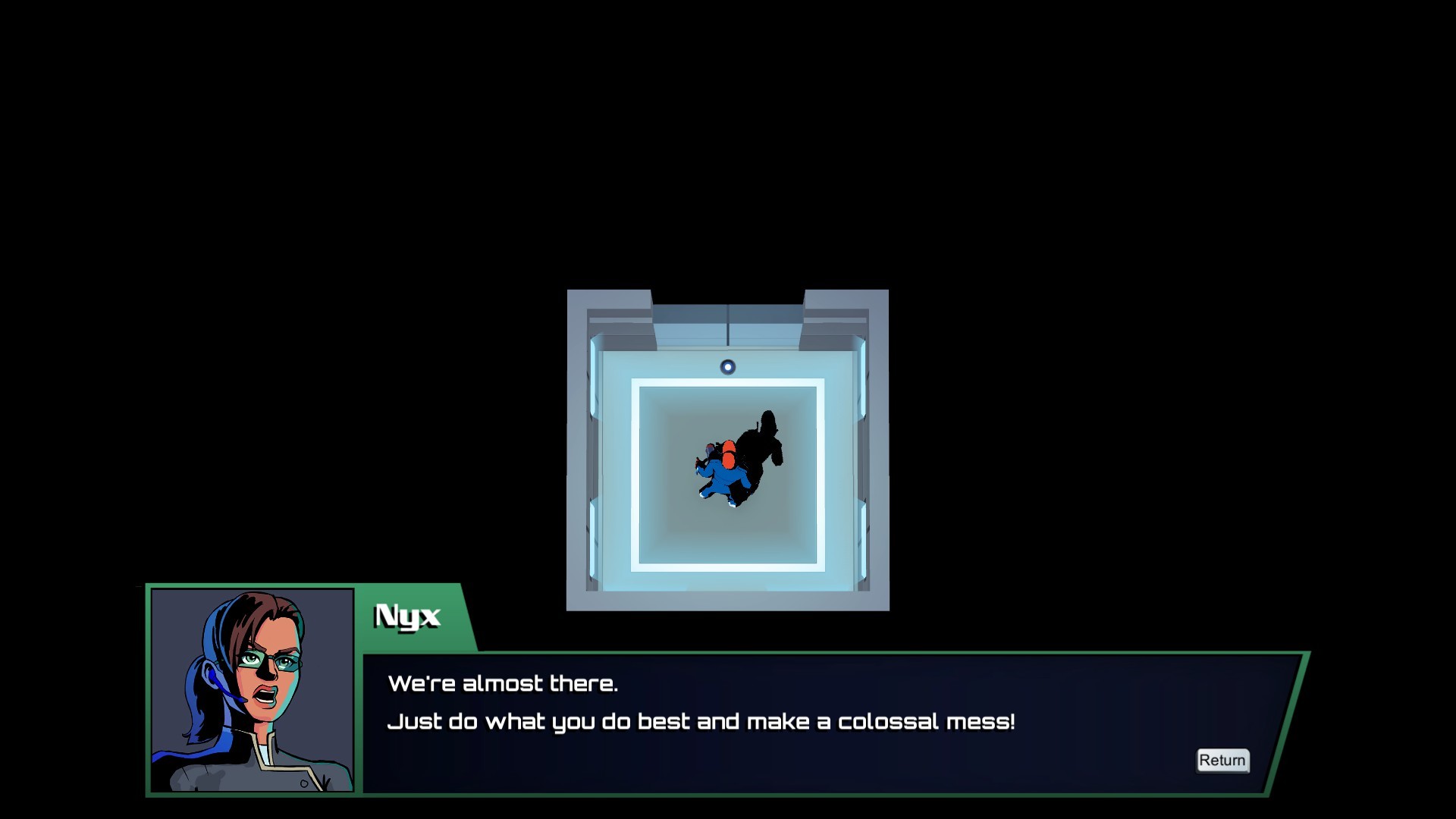Cosmic Star Heroine starts out promisingly enough, with an opening that gets straight to the action (reminiscent of Final Fantasy VII's reactor raid) and a practical sci-fi aesthetic that feels like a comfortable resurrection of Phantasy Star or Star Ocean.
It sets up an adventure with diverse characters spanning multiple worlds, a unique combat system with frequent surprises, and some modern sensibilities to smooth over common JRPG rough spots. But over the course of its campaign, Cosmic Star Heroine gradually neglects and ultimately discards most of that promise.
Perhaps its biggest shortcoming is the cast: despite being relatively large - there are 11 potential party members - I couldn't pick out any characters who were especially interesting or memorable. Everyone gets a cool little intro cutscene, and they all take turns being personally involved in the story, but... their backstories are flat and overly simple, all the dialog is excessively impersonal, and no events in the story challenge them in a way that would suggest character growth.
There are some story events that probably should have caused character reactions and showed more insight into their personalities, but simply didn't. The game's dialog is too straightforward and sterile, almost always a pure description of the scenario, with no personal or emotional perspective.
This lack of personality carries over into the world-building as well. There are three planets you can visit, each with multiple towns filled with NPCs, and in retrospect all I can really recall is that one planet was heavily urbanized; and another had a wild-west casino. It's a shame, because there is a lot of map space - and a lot of environment art - that could have been made more compelling with some thoughtful prose. Instead, there are "lab where an experiment went wrong" and "mines that were evacuated because monsters." Standard RPG stuff.
Between the un-memorable characters and the un-memorable environments, I actually had a tough time remembering what I was doing each time I reloaded my save file. Definitely not a sign of an engaging story. (Hilariously, although the game's menus provide an "Insight" option for the protagonist to remind you of the current story goal, this hint is often useless.)
The combat, in spite of a terrible tutorial - read several pages of text out in the field and hope that you remember them once you get into battle - does have a satisfyingly unique flavor to it. Most abilities become disabled after selecting them, until using a recharge ability; a "style" stat is built up by most abilities, and can then be unleashed by others; a "hyper" mode triggers every few turns, amplifying the power of your selected move. These mechanics combine to make battles feel like strategic choreography, as you plan several turns in advance when to use the right moves to the best effect.
It's also pretty cool that each character has a distinctive style and set of abilities, but doesn't fall into a trope like "healer" or "glass cannon." (Even though one character has songs, so he's clearly a bard.) Every character has healing moves, high-damage attacks, elemental magic, area-of-effect abilities... and configuring their available abilities to complement each other is a fun little out-of-combat exercise.
But, not all characters are created equally: magic for example is based on the "Sparke" stat, and some characters don't have much Sparke, so their magic abilities just aren't that good. There are some opportunities to boost stats with equipment, but not consistently. It's a lot easier to pick characters with obvious strengths, and just keep rolling with them.
Additionally, a lot of abilities are so situationally-specific that it feels wasteful to use a combat slot on them; and some abilities seem borderline useless. I particularly avoided any abilities that relied on "desperation mode," which only occurs when a character is out of HP and about to die.
I would also add that combat almost universally felt way too easy; but after beating the game, I noticed that I had actually picked an easy ("Agent") difficulty mode. So that one's on me.
As for its modern sensibilities? Cosmic Star Heroine brings a few welcome changes to JRPG traditions, like the ability to save anywhere, a "retry" option if you fall in battle, and fully healing your party after every encounter. But it doesn't go far enough -- I really would have appreciated some auto-saving, because if your party dies and retries don't work, you still have to go back to the last time you remembered to save.
The movement controls are a little buggy; the game would frequently lose track of my button presses because I was changing directions too fast. And the menu controls are especially buggy, reliably displaying the wrong thing when I'm shopping for or equipping new items. Like, showing character X's current weapon when I'm buying a weapon for character Y. This happened pretty consistently.
And while the lackluster writing suggests Cosmic Star Heroine might be a little unfinished, the many combat abilities with missing sound effects strongly suggest that the game is not complete.
All in all, though, Cosmic Star Heroine still isn't what I would call a "bad" game. It's more mild, more neutral; it falls short on many of its ambitions, but is perfectly playable. The story is throwaway, but rarely tedious (although the ending definitely is). And the combat system, while imperfect, is admirably unique.
It's a shame though, because its premise and structure show so much potential for more.
Better than: Final Fantasy II (SNES, Wii), Lunar Legend, Secret of Evermore
Not as good as: Chrono Trigger, Final Fantasy VI, Mass Effect
Less frustrating than, but not as interesting as: CrossCode
Progress: Finished on Agent difficulty.
